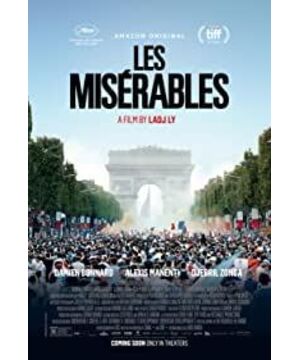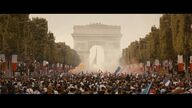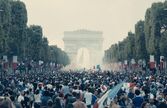The film restores the conditions of immigrant settlements well, and the performances and filming are also in place, but its social roots are simply a quote from Hugo's novel "Les Miserables": "There are no bad crops in this world, and no Bad people, only bad peasants", combined with the plot of the movie, it is easy for the audience to think that "crop people" refers to the police.
Faced with the same bad facts in the ghetto, different parties have different interpretations: the leftists who advocate multiculturalism mostly believe that the racial discrimination and religious discrimination of the right have caused group polarization; Groups are inherently inferior and want to be a good person for the sake of political correctness; marginal groups who feel social exclusion often think that they are the cauldron of Western values.
Obviously, the leftists' perceptions are based on certain facts. They stigmatize the immigrant group. The more public opinion believes that immigrants are incompatible and incompatible with the mainstream, the more likely it is that these immigrants will not be able to integrate, because they are subjected to discrimination and prejudice. After being treated, they can only rely more on their own group and religious beliefs to solve their passive situation and identity anxiety, thus making it more difficult to integrate into the country of migration. But this understanding is obviously not the whole root cause. Among all the social injustices in treating vulnerable groups such as immigrants, conceptual discrimination is only one injustice, and there are many other injustices in fact.
Unless all injustices are removed and immigrants still cannot integrate, the right-wing group theory cannot be proven. Of course, the views of the rightists are not completely unfounded, because some leftists have indeed gone a long way, even accommodating "jihad" propaganda.
The most important injustice in a society is not political inequality, but injustice in the distribution of wealth and opportunities for wealth. The social harm caused by wealth injustice is far greater than the harm caused by political inequality. The former directly caused countless civilizations in history to go from prosperity to decline. What is even more terrifying is that when the former is extremely unfair, the more equal the latter, the better the results. Bad, from ancient Greece and ancient Rome where democratic universal suffrage was implemented, to Europe and the United States in the 19th century, and then to today's third world. Under a corrupt democracy with a grossly unfair distribution of wealth, the huge, angry and depraved poor will elect worse and worse people in power, and high human rights with extremely unfair wealth will only bring about greater disasters.
However, in order to be relatively fair in the fields of land, education, medical care, etc., especially in a country like France, which is a big immigrant country, the systematic engineering of social equity for the influx of low-start groups is extremely complex and extremely difficult, and it is a test of the wisdom of the rulers. and ability.
As early as the 19th and 20th centuries, many developed countries realized that wealth injustice was a malignant tumor of social development, and began to build wealth equity one after another, including anti-monopoly, property tax, high welfare, etc., and achieved varying degrees of success. However, due to various resistances under the high human rights system, the achievement of these results is very difficult and limited. Even if Northern Europe has done relatively best, the pressure of immigration integration and the pressure of urban slums still exist.
Of course, there are alternative development models, that is, the miracle of the market economy under low human rights, such as the former South Africa and later China: let the migrant workers become amphibious people, work in sheds and collective dormitories, and return to their hometown once or twice a year for reunion , or lost their jobs and returned to their hometown to farm – except that Chongqing once solved the welfare housing problem for migrant workers in the city for a short period of time.
South Africa went a step further and set aside a special area on the outskirts of the city for black people to live in, the notorious apartheid.
On the one hand, South Africa keeps black people in the outskirts of the city. On the other hand, there are black residential areas in the main urban area. These residential areas are equivalent to the illegal construction of shanty towns in the reformed cities in my country. At that time, the South African government adopted an eviction policy to clear these slums. , There have been many such incidents, which have caused great repercussions, among which the Sophiaton incident that appeared in the 1950s is the most famous one. When dealing with such illegal constructions, European and American countries are often tied up, while South Africa and China used to deal with them relatively neatly.
South Africa calls these measures "orderly urbanization", and it is indeed very orderly, the city looks very beautiful, and the security is also very good. Although China is not as "orderly" as South Africa used to be, it also ranks second.
Although this system of low human rights of black labor in South Africa has achieved miraculous economic growth, it has also led to escalating domestic conflicts and international pressures, making it unsustainable. Since the late 1970s, a large amount of foreign capital has been continuously withdrawn from South Africa, and the South African economy has begun to slow down. This is of course a vicious circle. The economic downturn has further intensified social conflicts, and finally South Africa has changed in 1994. After the change, the high human rights South Africa immediately fell into the Latin American development trap. The long-term wealth injustice and grievances were all released under the high human rights system.
Compared with South Africa, our ability to resist international pressure is much stronger. my country's farmers have made great contributions and sacrifices in the process of economic development. I hope this group can get more compensation in the future social development to narrow the gap between the rich and the poor. achieve common prosperity.
View more about Les Misérables reviews









